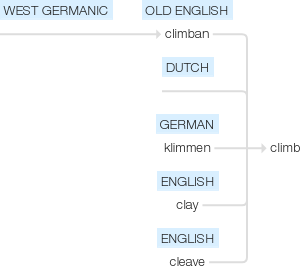Climb
Old English climban, of West Germanic origin; related to Dutch and German klimmen, also to clay and cleave2.
wiktionary
From Middle English climben, from Old English climban(“to climb”), from Proto-West Germanic *klimban, from Proto-Germanic *klimbaną(“to climb, go up by clinging”), believed to be a nasalised variant of Proto-Germanic *klibaną, *klibāną(“to stick, cleave”), from Proto-Indo-European *gley-(“to stick”). Cognate with West Frisian klimme(“to climb”), Dutch klimmen(“to climb”), German klimmen(“to climb”), Old Norse klembra(“to squeeze”), Icelandic klifra(“to climb”). Related to clamber. See also clay, glue.
etymonline
climb (v.)
Old English climban "raise oneself using hands and feet; rise gradually, ascend; make an ascent of" (past tense clamb, past participle clumben, clumbe), from West Germanic *klimban "go up by clinging" (source also of Dutch klimmen, Old High German klimban, German klimmen "to climb").
A strong verb in Old English, weak by 16c. Other Germanic languages long ago dropped the -b. Meaning "to mount as if by climbing" is from mid-14c. Figurative sense of "rise slowly by effort or as if by climbing" is from mid-13c. Related: Climbed; climbing.
climb (n.)
1580s, "act of climbing," from climb (v.). Meaning "an ascent by climbing" is from 1915, originally in aviation.
